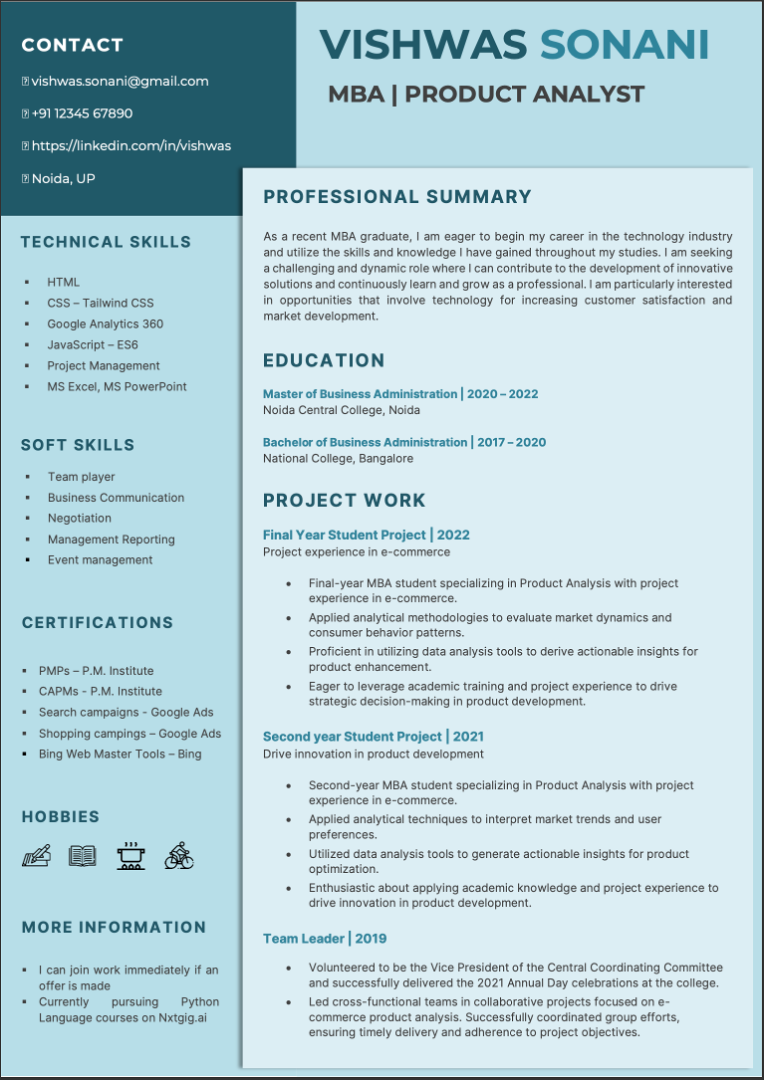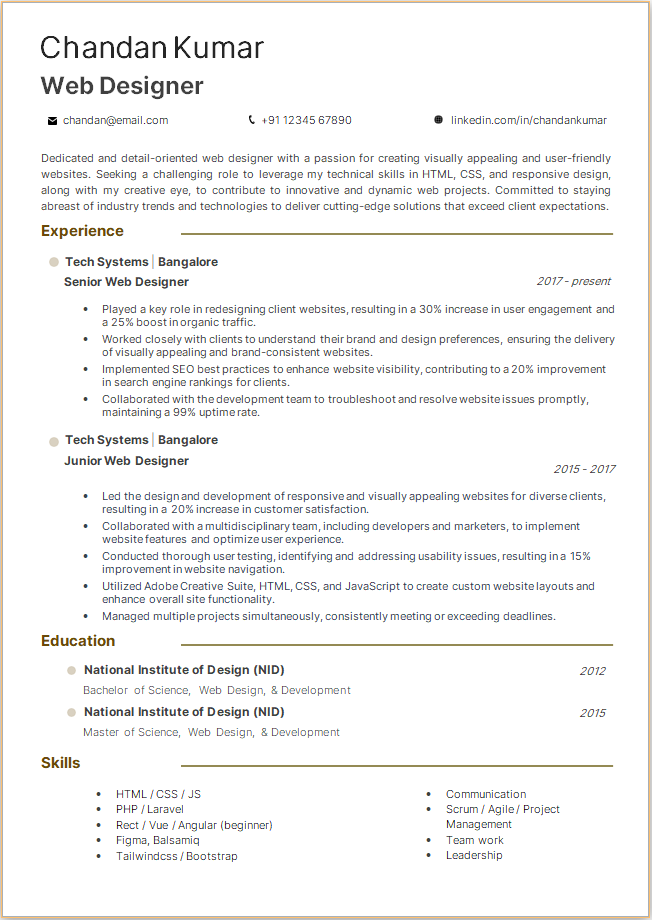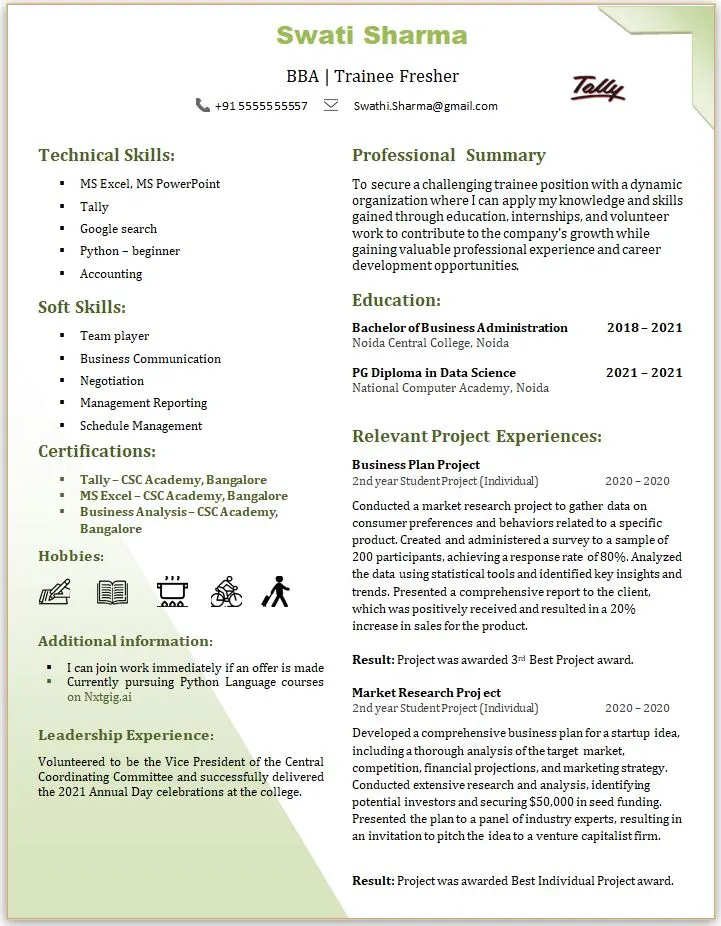Modern Resume
MBA Product Analyst Fresher Resume
Resume Format for Freshers
MBAprodFresher

Objective
As a recent MBA graduate, I am eager to begin my career in the technology industry and utilize the skills and knowledge I have gained throughout my studies. I am seeking a challenging and dynamic role where I can contribute to the development of innovative solutions and continuously learn and grow as a professional. I am particularly interested in opportunities that involve technology for increasing customer satisfaction and market development.
Education
Master of Business Administration | 2020 – 2022
Noida Central College, Noida
Bachelor of Business Administration | 2017 – 2020
National College, Bangalore
Skills
SOFT SKILLS Team player Business Communication Negotiation Management Reporting Event management HTML CSS – Tailwind CSS Google Analytics 360 JavaScript – ES6 Project Management MS Excel, MS PowerPoint
Projects
Two project ideas for college students studying any degree
If you are in your final year of your degree program, you are probably either already working on a project or looking for a project idea. What matters the most is often not how novel your project is since the hiring manager are going to look for ideas that have ready and real world application opportunities. Here are two project ideas for you to consider no matter what degree program you are pursuing - these project ideas have immense real world application potential and you will be glad to have picked these to work on.
Project Idea 1: Market Entry Strategy for a New Product
As an MBA candidate, you can demonstrate your strategic thinking and market analysis skills by developing a comprehensive market entry strategy for a new product or service. Choose an industry of interest and identify a gap or opportunity where a new product could thrive.
Key Components:
- Market Research: Conduct thorough market research to understand consumer needs, preferences, and existing competitors in the chosen industry.
- SWOT Analysis: Perform a detailed SWOT analysis (Strengths, Weaknesses, Opportunities, Threats) to assess both internal and external factors affecting the market entry.
- Target Audience: Define the target audience and create buyer personas to tailor your strategy to specific customer segments.
- Pricing and Positioning: Develop a pricing strategy and determine the positioning of the new product in the market.
- Distribution Channels: Outline the distribution channels that will be most effective for reaching the target market.
- Financial Projections: Provide financial projections, including estimated costs, revenues, and return on investment (ROI).
- Implementation Plan: Develop a step-by-step implementation plan outlining key milestones and activities to launch the new product successfully.
Project Idea 2: Business Process Optimization
Showcase your operational and organizational skills by focusing on business process optimization. Identify a company or industry facing efficiency challenges and propose strategies to streamline processes, reduce costs, and enhance overall performance.
Key Components:
- Process Analysis: Analyze current business processes within the chosen organization to identify bottlenecks and areas for improvement.
- Efficiency Recommendations: Provide detailed recommendations for optimizing key processes, considering the latest industry best practices.
- Technology Integration: Explore opportunities for technology integration to automate manual tasks and improve workflow efficiency.
- Cost-Benefit Analysis: Conduct a cost-benefit analysis to demonstrate the potential savings and return on investment resulting from the proposed optimizations.
- Change Management Plan: Develop a change management plan to ensure smooth implementation of process improvements, including communication strategies and training programs.
Interests/Hobbies
Blogging, Reading non fictional books on leadership, cooking and cycling
Experience
Final Year Student Project | 2022
Project experience in e-commerce
• Final-year MBA student specializing in Product Analysis with project experience in e-commerce.
• Applied analytical methodologies to evaluate market dynamics and consumer behavior patterns.
• Proficient in utilizing data analysis tools to derive actionable insights for product enhancement.
• Eager to leverage academic training and project experience to drive strategic decision-making in product development.
Second year Student Project | 2021
Drive innovation in product development
• Second-year MBA student specializing in Product Analysis with project experience in e-commerce.
• Applied analytical techniques to interpret market trends and user preferences.
• Utilized data analysis tools to generate actionable insights for product optimization.
• Enthusiastic about applying academic knowledge and project experience to drive innovation in product development.
Team Leader | 2019
• Volunteered to be the Vice President of the Central Coordinating Committee and successfully delivered the 2021 Annual Day celebrations at the college.
• Led cross-functional teams in collaborative projects focused on e-commerce product analysis. Successfully coordinated group efforts, ensuring timely delivery and adherence to project objectives.
Additional Inputs
Certifications to list on a fresher resume
Graduating with a degree is a significant accomplishment, but in today's competitive job market, having additional certifications can set you apart and enhance your employability. Whether you're entering the workforce for the first time or looking to pivot into a new industry, acquiring relevant certifications can open doors to exciting opportunities. Here are some of the most applicable certifications for degree holders seeking entry-level positions across various industries.
1. Project Management Professional (PMP)
The PMP certification is highly valued across industries and demonstrates proficiency in project management. It's ideal for degree holders interested in roles that involve planning, executing, and managing projects efficiently.
2. Google Analytics Individual Qualification (GAIQ)
In the digital age, understanding analytics is crucial. GAIQ certification is beneficial for degree holders looking to enter fields such as digital marketing, e-commerce, or data analysis, showcasing proficiency in Google Analytics.
3. Salesforce Certified Administrator
For those interested in a career in customer relationship management (CRM) or sales operations, the Salesforce Certified Administrator certification is widely recognized. It validates skills in Salesforce platform administration.
4. Certified ScrumMaster (CSM)
Agile methodologies are prevalent in software development and project management. The CSM certification is valuable for degree holders aiming to work in agile teams and understand the Scrum framework.
5. HubSpot Content Marketing Certification
Content marketing is a key aspect of modern business strategies. The HubSpot Content Marketing Certification is suitable for degree holders aspiring to work in content creation, digital marketing, or social media management.
6. CompTIA IT Fundamentals (ITF+)
For those looking to enter the IT field, the ITF+ certification provides foundational knowledge of IT concepts and practices. It's suitable for degree holders without a specific IT background.
7. Human Resources Certification Institute (HRCI) Professional in Human Resources (PHR)
Aspiring HR professionals can benefit from the PHR certification, which validates knowledge in HR principles and practices. It's advantageous for those seeking entry-level roles in human resources.
8. Certified Financial Planner (CFP)
The CFP certification is suitable for degree holders interested in financial planning and advisory roles. It's recognized in the finance and investment industry, opening doors to opportunities in wealth management.
9. Cisco Certified Network Associate (CCNA)
For individuals interested in networking and IT infrastructure roles, the CCNA certification from Cisco is a valuable credential. It demonstrates proficiency in networking concepts and technologies.
10. Certified Ethical Hacker (CEH)
In the field of cybersecurity, the CEH certification is highly regarded. It's suitable for degree holders aiming to enter roles related to ethical hacking, penetration testing, and cybersecurity analysis.
Conclusion
Enhancing your skill set with relevant certifications can significantly boost your marketability and increase your chances of landing a desirable entry-level position. Evaluate your career goals and choose certifications that align with your interests and the requirements of your target industry.
Cracking the Code: Most Common Fresher Interview Questions for Technical Roles
Securing a technical role as a fresher requires not just academic knowledge but also the ability to articulate your skills and problem-solving approach. Technical interviews often include a mix of coding, problem-solving, and theoretical questions to assess your suitability for the role. Here's a guide to the most common fresher interview questions for technical positions.
1. Tell Me About Yourself:
This question is often used to gauge your communication skills and provide an overview of your background. Focus on your academic achievements, any relevant projects, and a brief mention of your interests in the tech field.
2. Data Structures and Algorithms:
Expect questions on fundamental data structures like arrays, linked lists, and trees, as well as algorithms. Be prepared to discuss the time and space complexity of your solutions.
3. Coding Challenges:
You might be asked to solve coding challenges on a whiteboard or through an online coding platform. Practice solving common problems and explaining your thought process clearly.
4. Problem-Solving Scenarios:
Interviewers may present real-world problems and ask you to propose solutions. Focus on your problem-solving approach, considering factors like efficiency, scalability, and potential challenges.
5. Technical Project Discussion:
Be ready to discuss any technical projects you've worked on, including your role, the challenges you faced, and the solutions you implemented. Highlight any innovative or unique aspects of your projects.
6. System Design:
For roles involving system architecture, you might be asked to design a system or discuss how you would approach designing a scalable and efficient solution for a given scenario.
7. Databases and SQL:
Brush up on your database knowledge and be prepared to write SQL queries. Understand concepts like normalization, indexing, and how to optimize queries for better performance.
8. Object-Oriented Programming (OOP):
Know the principles of OOP and be ready to discuss how you would design classes, handle inheritance, and implement polymorphism in a given context.
9. Soft Skills:
Technical interviews may also include questions to assess your soft skills. Be prepared to discuss teamwork, communication, and how you handle challenges or conflicts in a collaborative environment.
10. Industry Trends and Technologies:
Stay updated on the latest trends and technologies in the industry. You might be asked about your knowledge of specific tools, frameworks, or advancements relevant to the role.
Conclusion
Technical interviews can be challenging, but thorough preparation and a


